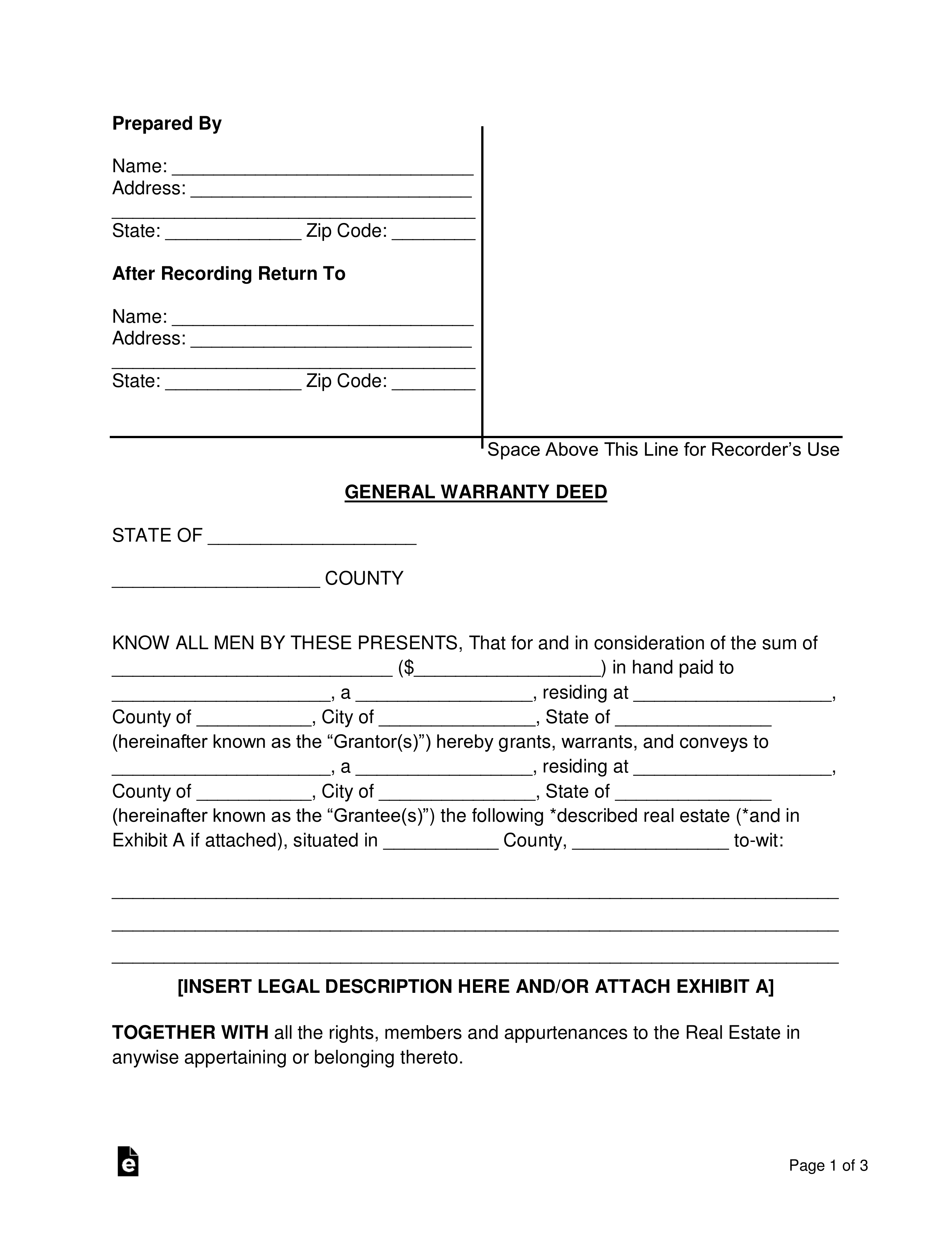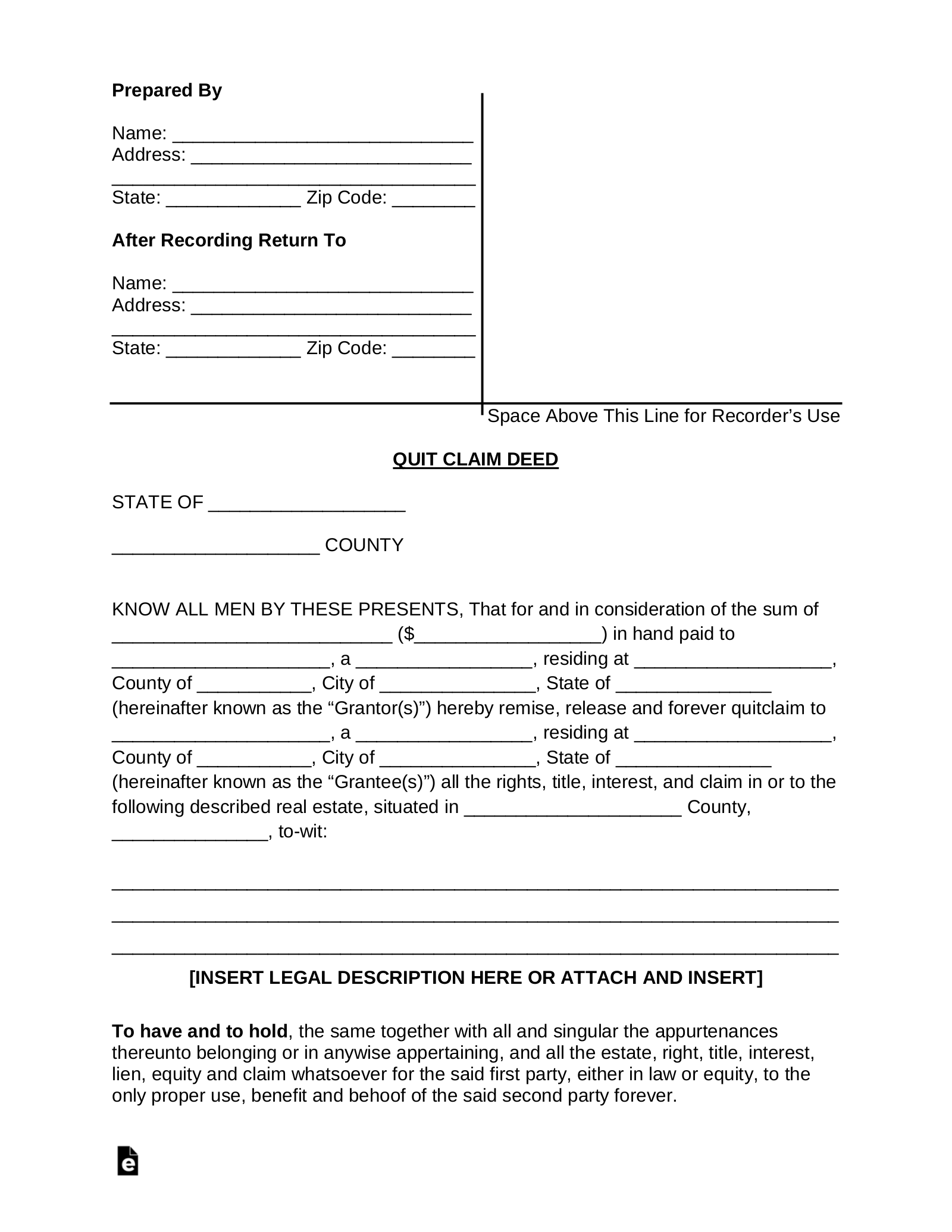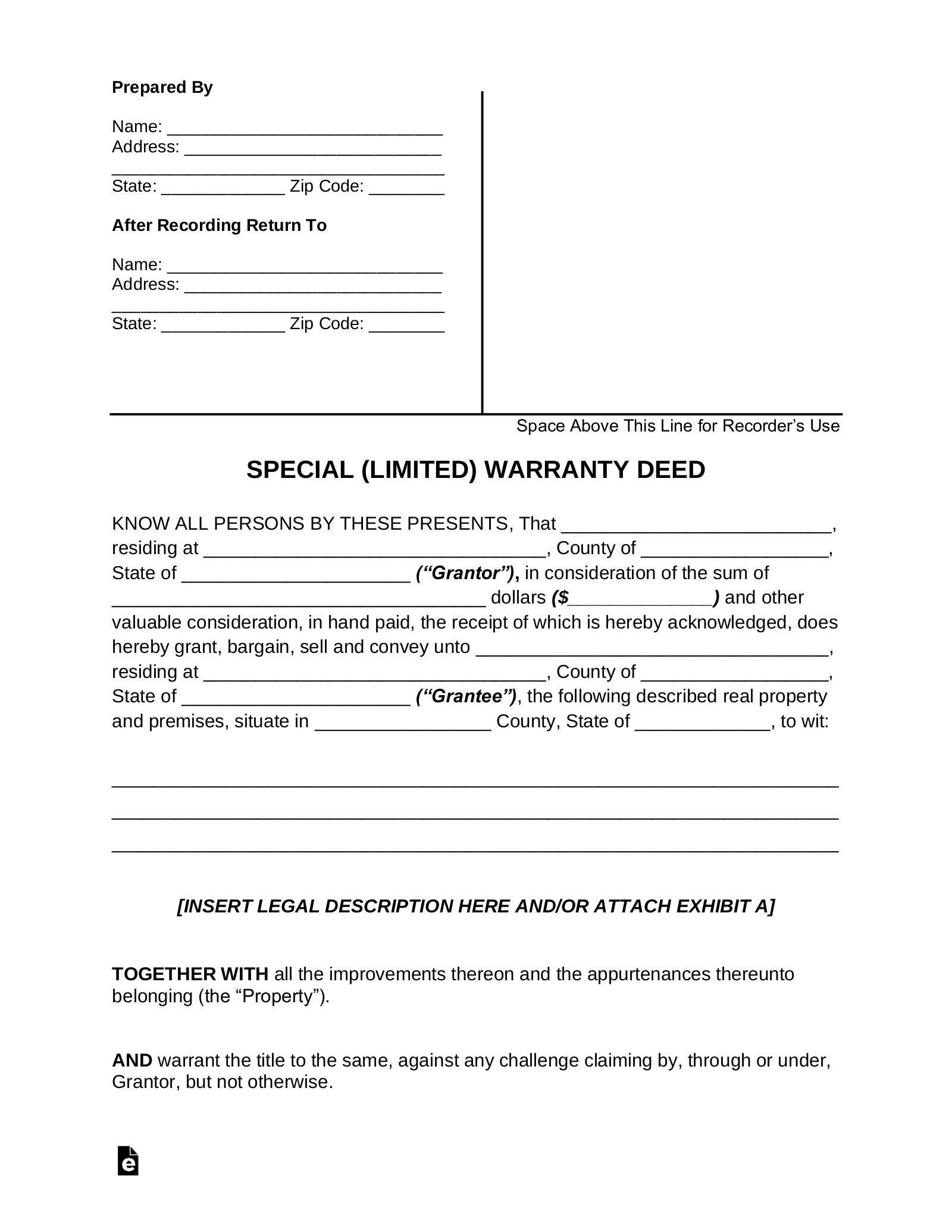Updated April 04, 2024
A deed conveys the ownership of property from a seller (“grantor”) to a buyer (“grantee”). After completing the deed, it is recorded in the local registry of deeds. Transferring the property may incur transfer taxes, which must be paid at the recording time.
By Type (4)
 General Warranty Deed – Guarantees that the grantor has the full authority, also known as “fee simple,” to transfer the title to the grantee. General Warranty Deed – Guarantees that the grantor has the full authority, also known as “fee simple,” to transfer the title to the grantee.
Download: PDF, MS Word, OpenDocument |
 Quit Claim Deed – Commonly used when the grantor transfers property for business, divorce, litigation, or between family without a financial exchange. There is no guarantee given by the grantor that there aren’t any defects to the title of the property. Quit Claim Deed – Commonly used when the grantor transfers property for business, divorce, litigation, or between family without a financial exchange. There is no guarantee given by the grantor that there aren’t any defects to the title of the property.
Download: PDF, MS Word, OpenDocument |
 Special Warranty Deed – Guarantees the rights to the title from the grantor’s time of ownership but not from any prior owners. Less commonly used but useful in some cases. Special Warranty Deed – Guarantees the rights to the title from the grantor’s time of ownership but not from any prior owners. Less commonly used but useful in some cases.
Download: PDF, MS Word, OpenDocument |
 Transfer on Death Deed – Allows a grantor to designate a specific beneficiary to receive real estate property upon death, bypassing the probate process. Transfer on Death Deed – Allows a grantor to designate a specific beneficiary to receive real estate property upon death, bypassing the probate process.
Download: PDF, MS Word, OpenDocument |
By State
- Alabama
- Alaska
- Arizona
- Arkansas
- California
- Colorado
- Connecticut
- Delaware
- Florida
- Georgia
- Hawaii
- Idaho
- Illinois
- Indiana
- Iowa
- Kansas
- Kentucky
- Louisiana
- Maine
- Maryland
- Massachusetts
- Michigan
- Minnesota
- Mississippi
- Missouri
- Montana
- Nebraska
- Nevada
- New Hampshire
- New Jersey
- New Mexico
- New York
- North Carolina
- North Dakota
- Ohio
- Oklahoma
- Oregon
- Pennsylvania
- Rhode Island
- South Carolina
- South Dakota
- Tennessee
- Texas
- Utah
- Vermont
- Virginia
- Washington
- Washington D.C.
- West Virginia
- Wisconsin
- Wyoming
Table of Contents |
Ownership Types
There are three types of ownership interest in property:
Joint Tenants (Rights of Survivorship) – If one of the spouses becomes deceased, the other spouse obtains their ownership interest in the property.
Tenants in Common – Spouses are allowed to sell their ownership interest without the approval of the other. If one of the spouses becomes deceased, the ownership of the property would transfer to the heirs listed in their Last Will and Testament.
Tenants by the Entirety – Does not allow one spouse to sell their interest in the property without the other’s consent.
Signing Requirements & Where to Record
In each of the following states, only the grantor(s) have to sign the deed under the following requirements. After the deed has been completed and signed, it is ready to be filed with the Recorder’s Office (or the Clerk of Court in some states).
| State | Signing Requirements | Where to Record |
| Alabama | 2 Witnesses or a Notary Public (§ 35-4-20) | County Probate Judge |
| Alaska | Notary Public (AS 34.15.150) | District Recorder’s Office |
| Arizona | Notary Public (§ 33-401) | County Recorder’s Office |
| Arkansas | 2 Disinterested Witnesses and a Notary Public (§ 16-47-106) | Circuit Court (See Map) |
| California | Notary Public (Section 27287) | County Recorder’s Office |
| Colorado | Notary Public (§ 38-35-103) | County Recorder’s Office |
| Connecticut | Notary Public and 2 Witnesses (§ 47-5) | County Recording Office (See Map of Counties) |
| Delaware | Notary Public (§ 122) | Kent, New Castle, or Sussex County |
| Florida | 2 Witnesses and a Notary Public (§ 695.03) | County Recording Office (See County Websites) |
| Georgia | Notary Public and 1 Other Witness (§ 44-5-30 & § 44-2-15) | Clerk of the Superior Court |
| Hawaii | Notary Public (§ 502-41) | Hawaii Bureau of Conveyances |
| Idaho | Notary Public (§ 55-805) | County Recorder’s Office (See County Websites) |
| Illinois | Notary Public (765 ILCS 5/20) | County Recorder’s Office |
| Indiana | Notary Public (§ 32-21-2-3) | County Recorder’s Office |
| Iowa | Notary Public (§ 558.31) | County Recorder’s Office (See County Websites) |
| Kansas | Notary Public (§ 58-2205) | County Recorder’s Office (See County Websites) |
| Kentucky | 2 Witnesses or a Notary Public (KRS 382.130) | County Clerk’s Office |
| Louisiana | 2 Witnesses and a Notary Public (CC 1839) | Clerk of Court’s Office |
| Maine | Notary Public ( Title 33, § 203) | County Registry of Deeds |
| Maryland | Notary Public (§ 3-104) | Division of Land Records at the Circuit Court |
| Massachusetts | Notary Public (Chapter 183, Section 29) | County Registry of Deeds |
| Michigan | Notary Public (§ 565.201) | County Registry of Deeds |
| Minnesota | Notary Public (§ 507.24) | County Recorder’s Office |
| Mississippi | Notary Public (§ 89-3-7) | Clerk of the Chancery Clerk’s Office |
| Missouri | Notary Public (§ 442.150) | County Recorder of Deeds |
| Montana | Notary Public (§ 70-21-203) | County Clerk and Recorder’s Office |
| Nebraska | Notary Public (NRS 76-211) | County Recorder’s Office (See County Websites) |
| Nevada | Notary Public (NRS 111.105) | See List of County Recorders |
| New Hampshire | Notary Public (§ 477:3) | County Registry of Deeds Office |
| New Jersey | Notary Public (Section 46:4-1) | County Clerk’s Office |
| New Mexico | Notary Public (Section 47-1-44) | County Clerk’s Office |
| New York | Notary Public (RPP § 306) | County Court Clerk’s Office (See County Websites) |
| North Carolina | Notary Public (§ 47-38) | County Registry of Deeds |
| North Dakota | Notary Public (§ 47-19-03) | County Recorder’s Office |
| Ohio | Notary Public (§ 5301.01) | County Recorder’s Office |
| Oklahoma | Notary Public (§ 16-26) | County Clerk’s Office |
| Oregon | Notary Public (§ 93.410) | County Recorder’s Office (See County Websites) |
| Pennsylvania | Notary Public (21 P.S. § 42) | County Recorder’s Office (See County Websites) |
| Rhode Island | Notary Public (§ 34-11-1.1) | City/Town Office (varies by area) (See City/Town Websites) |
| South Carolina | 2 Subscribing Witnesses or Notary Public (§ 30-5-30) | County Recorders of Deeds |
| South Dakota | 1 Subscribing Witness or Notary Public (§ 43-25-26) | County Registry of Deeds |
| Tennessee | 2 Witnesses or a Notary Public (§ 66-5-106) | County Recorder’s Office |
| Texas | 2 Witnesses or a Notary Public (§ 12.001)) | County Register of Deeds (County Clerk’s Office) |
| Utah | Notary Public (§ 57-3-101) | County Recorder’s Office (See County Websites) |
| Vermont | Notary Public (27 V.S.A. § 301) | County Clerk’s Office |
| Virginia | 2 Witnesses or Notary Public (§ 55-106) | Clerk of the Circuit Court |
| Washington | Notary Public (RCW 64.04.020) | County Recorder’s Office (See County Websites) |
| West Virginia | 2 Witnesses or a Notary Public (§ 39-1-2) | County Clerk’s Office |
| Wisconsin | Notary Public (§ 706.06) | County Register of Deeds |
| Wyoming | Notary Public (§ 34-1-113) | County Clerk’s Office |
